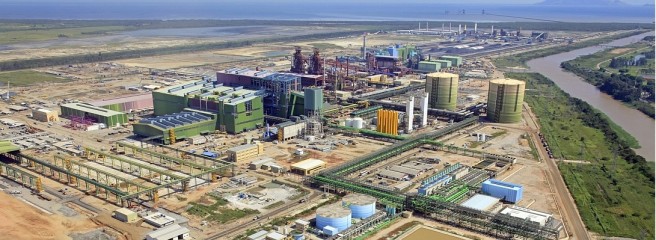
The plant in Sepetiba Bay, Brazil: It should produce more cheaply than Germany – it produced more expensive
Mismanagement and corruption
The crisis of ThyssenKrupp has much to do with the new steel mill in Sepetiba, Brazil: It should produce steel slabs at a significant lower cost compared to the slabs produced in Germany. In fact, the slab was $ 170 more expensive.
The loss was caused primarily by a 3.6 billion euro write down on its steel mills in the United States and Brazil, which Thyssen is trying to sell. The book value of the mills, bundled in the Steel Americas business, is now 3.9 billion euros, well below the 12 billion euros Thyssen invested in the unit over the years. The division had been meant to give ThyssenKrupp a foothold in the Americas, but costs for the mills ran far over budget while demand for the steel they made subsided.
Thyssen said management at the time based its decisions on overly optimistic projections and took too long to tell the supervisory board of problems with the project, which eventually forced Hiesinger’s predecessor Ekkehard Schulz to step down.
The story of a gigantic bad investment.
It should have been the really big coup. What came out is a disaster, likely to shake this company to its foundations. The titan ThyssenKrupp staggers. The largest German steel and technology company in Brazil literally built the steel mill in the slumps in the bay of Sepetiba. The construction of the steel plant, which would produce steel slabs far cheaper than German plants, without all kinds of cumbersome environmental regulations, fell into a multi-billion dollar disaster. On top of that, fishermen and residents complain against the steel work due to massive environmental violations.
“At first we had no luck, then came bad luck,” humorously said by Gerhard Cromme, Chairman of the Supervisory Board ThyssenKrupp, almost a year ago to appease the shareholders at the Annual General Meeting in Bochum’s Ruhr Congress. Already there was clear how much of this entrepreneurial venture would come to stand the Group: Instead of the originally planned 1.9 billion euros it cost – until then – a quadruple it.
Not tricked, only optimistic
Cromme, who had recently commissioned a legal investigation into the case, tried to defend the executive management and Board of ThyssenKrupp. They had cheated nor deceived, they had reported only too optimistic.
The shareholders are now more than worried, especially since ThyssenKrupp on Wednesday night fired half board. “Shows this radical solution us how serious the situation is,” says Thomas Hecht Fischer, CEO of the managing director of the German association for securities (DSW), and: “We must now assume that it is about a completely different dimension.
Market value well below book value
The book value of the plants in Brazil and in the U.S. is seven billion euros, but the market value is rather under four billion euros. Therefore ThyssenKrupp has written down around €3 billion. Furthermore, ThyssenKrupp is accused of bribery and violating antitrust regulations. . Now even the has to be feared that the full German steel industry stands on trial.
70 kilometers from Rio de Janeiro can be seen what ThyssenKrupp did stumble: the blast furnaces, the coke plant, the power plant, which is situated between the sea and the favelas of Rio de Janeiro steel work. In September 2006, as Ekkehard Schulz, the former chief executive of Thyssen-Krupp, the first sod was done here, the future seemed glorious. And the numbers that make up the consulting firm McKinsey worked in their feasibility study promised great things.
Cheap energy, low costs labour and “easy” environmental regulations
With cheaper energy, lower wages, fewer environmental regulations, each Brazilian steel slab should be $ 55 cheaper per ton of steel produced than in Germany. Million tons of steel were to be transported by ship, refined in Germany or in the United States. A supposedly lucrative large investment.
The reality however was different. The steel mill site turned out to be so muddy and slumpy that an extra million dollar investment had to be made to make sure the mill was not sinking in the slumps. But above all, it was decided in the Thyssen-Krupp’s boardroom, that a Chinese company was given the order to commission the work, rather than the fully owned German subsidiary Uhde. A decision that was to proved to be fatal. From year to year became the mill became more expensive to build. Up to today the plant due still does not run at full capacity due to technical problems. The steel slab is already $ 170 more expensive than from German production.
The coking plant: build, demolished, rebuild
And the coking plant, which was also built by the Chinese, has been demolished. Uhde, which was rejected at the first time because of their higher priced is now building at the same place a new one.Of course this will not be free of charge.
Additionally in 2007, the protests of fishermen came for the pollution of their fish-rich coast. And as soon as the plant was turned into operation in June 2010, it was raining polluted dust all over the place. Residents protested and complained. The dust was found to be adversely affected by toxic heavy metals. The prosecutor of Rio de Janeiro rose soon after charges of massive environmental violations.
“Mr. Cromme, how often were you there?”
Despite all the delays, construction, technical and polluting defects, no one at the board of ThyssenKrupp seems to have recognized the problems and take proper measures. “Mr. Cromme how often were you even there?” Said one shareholder at the shareholders meeting in January 2011.
The day after the shareholders meeting on December the 11th, ThyssenKrupp Chief Executive Heinrich Hiesinger vowed to clean up Germany’s top steel-maker after recent losses and corruption allegations prompted him to axe half his management board.
“I’m not going to talk anything up here, because it is obvious that a great deal has gone wrong in the past,” he told journalists at a news conference on Tuesday, the day after Thyssen reported a 4.7 billion euro ($6.08 billion) annual loss.
Thyssen also decided not to pay shareholders a dividend for the first time in the company’s history,
To be continued…..
RIO DE JANEIRO (AP) — When Frenchman Gwenel Lecourieux was gearing up to move to Brazil, the country with its swelling upper class and world-renowned hunger for luxury goods seemed like the perfect place to set up his…






